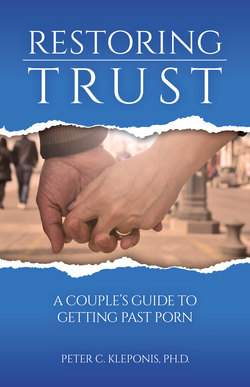Читать книгу Restoring Trust - Peter C. Kleponis Ph.D. SATP-C - Страница 11
На сайте Литреса книга снята с продажи.
ОглавлениеKey Terms
Before you can begin the healing process, it’s important to know the definitions of several key terms, which will be used throughout this book.
Accountability: Being responsible for one’s words and actions.
Betrayal trauma: The deep emotional woundedness one feels as a result of sexual betrayal. Symptoms can often be similar to those of post-traumatic stress disorder. (See definition of trauma below.)
Boundaries: Rules/limits set to protect people and to enable them to have healthy relationships.
Cybersex: Using the internet alone or with other people for sexual purposes.
Disclosure: Revealing past sexual experiences outside a marriage.
Gaslighting: Using lies to excuse or cover over sexual activity.
Guilt: Recognition that one has sinned and must atone for it. This can lead to healing and reconciliation.
Pornography: Any image that leads a person to use another person for his/her own sexual pleasure. It is devoid of love, relationship, and intimacy and can be highly addictive (Kleponis, 2014).
Recovery: A process of change through which individuals improve their health and wellness, live self-directed lives, and strive to reach their full potential. Four signs of recovery are:
1. Being able to address problems as they happen, without self-medicating, and without getting stressed out.
2. Having at least one person you can be completely honest with.
3. Establishing personal boundaries and knowing which issues are ours, and which ones belong to other people.
4. Taking the time to restore your energy — physical and emotional — when you are tired (SAMHSA, 2016).
Self-medicating: Using pornography or any other addictive substance or behavior as a way to cope with deep emotional wounds or trauma.
Sexual Addiction: Any persistent and escalating unhealthy pattern of sexual behavior. It is compulsive in nature, and used to avoid or change feelings despite destructive consequences to self and others (Laaser, 1992).
Shame: The belief that because of the sins a person has committed, or the sins committed against a person, he/she is fundamentally a bad person beyond redemption. This often leads a person to want to hide.
Sobriety: No sex with one’s self, or anyone else, except one’s spouse (Sexaholics Anonymous [SA], 1989).
Transformation: Becoming a new creation in Christ — the person God created you to be. This is the ultimate goal of recovery (Kleponis, 2016).
Trauma: An occurrence wherein an individual sees or experiences a risk to their own life or physical safety, or that of other people, and feels terror, fear, or helplessness. The occurrence might additionally cause confusion, dissociation, and a loss of a feeling of security.
Triggers: People, places, things, emotions, or situations that can activate the pain of past emotional wounds. This can lead a person to act in destructive ways to cope with the pain.
